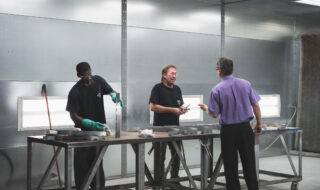January 8, 2025
2025 Main Street Agenda for Illinois
A Main Street Agenda is a growth agenda. Small businesses drive local economies across the state. They provide jobs, services, and opportunities. When Main Street prospers, Illinois prospers.
Small businesses employ over 1.6 million workers in Illinois. Sixty-four percent of businesses in Illinois have less than five employees and eighty-eight percent have less than 20, according to US Census Bureau data.
These small businesses play an integral role in their local communities. According to a recent survey of NFIB members:
- Seventy-six percent of small business owners volunteer at schools, sports teams, religious organizations, and other community groups.
- Ninety percent of small business owners donate money to educational, civic, or religious groups in their communities.
These business owners, who are so vested in their communities, are taking significant risks to run their small businesses. They invest their time, money, and reputations in their businesses. They work hard to make the next sale, ink another contract, create a new product.
Inflation, red tape, and high taxes make it more expensive to run a small business. To unleash the power of Illinois’ entrepreneurs and Main Street businesses, Illinois must pursue policies that will remove barriers to doing business in the state. It must pursue a growth agenda.
As the Illinois General Assembly reconvenes, NFIB will continue to advocate on behalf of Illinois small businesses and job creators, focusing on the following areas:
Fight Job-Killing Regulations and Red Tape
In 2023, Illinois had 282,040 regulatory restrictions on the books, according to research by the Mercatus Center, making Illinois the fourth most regulated state. Since then, the number of mandates has only grown, discouraging creativity, flexibility, and problem solving by imposing bureaucratic, top-down ‘solutions’ to unique small-business situations.
Endless regulation and red tape distract Illinois small businesses from serving their customers, creating jobs, and enriching their communities. Small businesses are, in fact, small. They don’t have full-time human-resources specialists, lawyers, accountants, or regulatory-compliance teams. They don’t have the time to go through the thousands of pages of new laws and regulations enacted every year. Yet if they run afoul of countless paper-pushing requirements they could face costly civil penalties or even lawsuits filed by non-injured special-interest groups.
NFIB will continue to oppose these costly one-size-fits-all business mandates at both the state and federal level that ignore the complexity and diversity of Illinois’ small-business community.
Oppose Tax Increases to Fund Out-of-Control Spending
Politicians love to spend other people’s money and then brag about how they’re “investing” it. Many of these dollars extracted from our local communities fail to make their way back to our local economies. Instead of creating wealth, Springfield too often squanders it on the politically connected special-interest groups and lobbies.
Taking advantage of federal largess over the past few years, state spending has significantly outstripped GDP growth. Such spending growth is unsustainable without matching economic growth.
With projected upcoming budget deficits and special-interest groups clamoring for yet more spending, NFIB will continue to champion making the federal small business tax deduction permanent and will oppose efforts to raise small business taxes at the state level.
Resist Policies that Increase the Cost of Doing Business
Small businesses have been hit hard by rising costs. In NFIB’s monthly Small Business Economic Trends (SBET) survey, small business owners consistently list inflation as their number one challenge.
Despite years of rising prices, Illinois continues to flirt with new policy measures that would further raise the cost of doing business in Illinois. Demonstrating how out of touch state government can be with Main Street economics, the Illinois Commerce Commission is currently holding hearings to explore the phasing out (or banning) of the use of natural gas in homes, farms, and businesses across this state. The Illinois Pollution Control Board, meanwhile, is holding hearings to limit or ban the sale of gasoline- and diesel-powered vehicles. Radical environmental groups have been pushing for additional fees and regulation on land and property development, a sure way to stymy economic investment and growth.
These proposals, and others like them, would raise the cost of doing business in Illinois. While Illinois has many structural advantages—transit, weather, workforce, etc.—Illinois policymakers cannot continue to make it more expensive to do business in the state if they expect to see sustainable economic growth.
Unleash the Power of Local Entrepreneurs and Job Creators
To achieve its economic potential and sustainable growth, Illinois must unleash entrepreneurs and small-business owners to invest and build in their local communities by removing gratuitous red tape, limiting taxes, and making Illinois a competitive place to do business. That is the recipe for the thriving Main Street economy that Illinois needs.
NFIB is a member-driven organization advocating on behalf of small and independent businesses nationwide.
Related Articles














